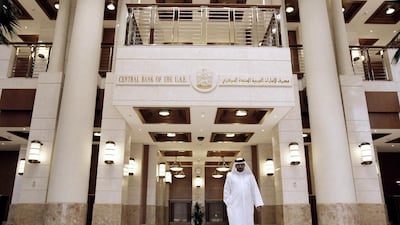The Central Bank of the UAE raised its key interest rates by 25 basis points following the US Federal Reserve’s move on Wednesday to hike its benchmark rate by the same amount to the highest level since the global financial crisis.
The central bank raised the interest rate on the certificate of deposits to 2 per cent. The UAE uses certificates of deposit as a monetary policy instrument through which rates are transmitted in the absence of an independent monetary policy.
“The Central Bank of the UAE announced that, effective Thursday, March 22, 2018, it will raise interest rates applied to the issuance of its Certificates of Deposits in line with the increase in interest rates on US Dollar, following the Federal Reserve Board’s decision to increase the Federal Funds Rate by 25 basis points,” the bank said.
The Fed raised its federal fund target rate to a range of 1.5 per cent to 1.75 per cent. The Federal Reserve chairman Jerome Powell said that the central bank would likely undertake bigger hikes in 2019 and 2020 as the US economy improves.
________________
Read More:
Fed lifts rates, steepens path through 2020 for more hikes
________________
Other countries in the Arabian Gulf raised their rates too. The central bank of Bahrain raised its key policy interest rate on the one-week deposit facility by 25 basis points to 2 per cent.
The central bank of Kuwait, the only regulator in the region which pegs its currency to a basket that includes the dollar, raised its discount rate by 25 basis points to 2.75 per cent, the first adjustment in a year. Qatar’s central bank raised its deposit rate by 25 basis points to 1.75 per cent but left its lending rates unchanged.
The central banks of Saudi Arabia and Oman did not immediately appear to raise rates following the Fed. However, the Saudi Arabian Monetary Authority raised its benchmark rate by 25 basis points earlier this month.
Central banks in the region banks don’t always raise or cut rates on each specific occasion when the Federal Reserve does but they have followed it in its broad outline over the long run. Rising rates come however at a moment when the economic growth in the region is not on par with the US which may make some banks hesitant to raise rates quickly, according to economists.
GCC central banks again largely followed the Fed "albeit with some variations,” said Monica Malik, chief economist at Abu Dhabi Commercial Bank. “Recently, GCC central bank interest rate differentials with the federal fund target rate have been a key factor, alongside the need to limit the tightening in monetary conditions as economic activity remains weak and GCC credit growth lacklustre.”
Elsewhere, the Bank of England kept its key lending rate unchanged at 0.5 per cent and in China, the central bank raised its rate on short term loans by 5 basis points.
Global shares dropped, with S&P 500 futures sliding 1.1 per cent ahead of the opening bell. The Euro Stoxx 50, a measure of European equities, slipped 1.7 per cent. The Hang Seng Index in Hong Kong fell 1.1 per cent while the Sensex measure of stocks in India declined 0.4 per cent. The British pound slipped 0.1 per cent while the euro fell 0.2 per cent.
“The markets have slipped as investor attention shifts towards US President Trump and an impending trade war,” Mihir Kapadia, chief executive officer and Founder of Sun Global Investment. “Analysts are concerned as the President prepares to formally declare trade tariffs on China in addition to other economic sanctions in retaliation for alleged intellectual property theft.”
US President Donald Trump administration is set to slap $50 billion of tariffs against China for intellectual property rights violations, Bloomberg News reported late Wednesday in the US.

